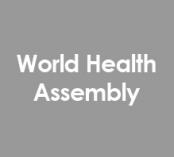
At the 67th World Health Assembly in Geneva last week, Chantal Baumgarten of Save the Children delivered a statement on behalf of her organization as well 21 other organizations who are affiliated with the Safeguarding Health in Conflict Coalition. The statement was made in respond to agenda item 17M: “WHO’s response, and role as the health cluster lead, in meeting the growing demands of health in humanitarian emergencies (resolution WHA 65.20).”
The statement’s text appears below and on the WHO’s website.
Honorable Chair, Director-General, delegates and colleagues,
I am speaking on behalf of Save the Children as well as 21 organizations affiliated as members or observers of the Safeguarding Health in Conflict Coalition, which works to strengthen norms for the respect and protection of health care in situations of conflict and civil unrest.
The global health community continues to face a crisis in the security of health, with attacks on doctors, nurses, community vaccinators, emergency medical workers, as well as on hospitals, clinics, ambulances, and patients. In the last year, such attacks have occurred throughout the world, resulting in damaged and destroyed facilities, compromised health systems, outward-migration of health workers in places where they are desperately needed, reduced access by patients to essential health services, and fewer child vaccinations.
We salute the Director General for speaking out about the crisis and for highlighting the issue at this World Health Assembly. We also are pleased that, as part of its progress on the Assembly’s humanitarian response initiative, WHO is moving forward in providing global leadership in methods for systematic collection and dissemination of data on attacks on health facilities, health workers, health transports, and patients in complex humanitarian emergencies, as set forth in WHA resolution 65.20. We look forward to its further work on implementation.
We urge member states to provide the resources to WHO to enable it to provide this leadership, and support its coordinating its work with other UN agencies and civil society organizations.
We stand ready to assist WHO in developing the evidence base necessary to increase the security of people seeking care and those who serve them.
Thank you.
Endorsers
Agency Coordinating Body for Afghan Relief and Development; Alliance of Health Organizations, Afghanistan; Center for Public Health and Human Rights, Johns Hopkins Bloomberg School of Public Health; Doctors for Human Rights; Doctors of the World USA; Friends of the Global Fund Africa; Global Health through Education, Training and Service; Human Rights Watch; International Federation of Health and Human Rights Organisations; International Health Protection Initiative; International Rescue Committee; IntraHealth International; Irish Nurses and Midwives Association; Karen Human Rights Group; Management Sciences for Health; Maternal and Child Health Advocacy International; Medact; Physicians for Human Rights; Save the Children; Syrian American Medical Society; World Vision

